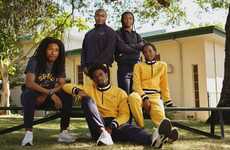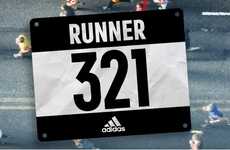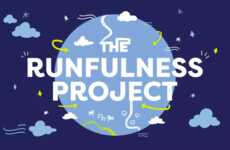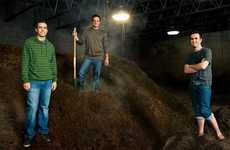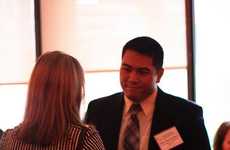
Tiana Reid — October 21, 2011 — Social Good
References: kourage.org & twitter
I came across Kourage Athletics by way of a quick Twitter conversation stemming from Walmart’s possible delve into fair trade sales. Of course, critics abound about this venture but @kouragerunning expressed that they’d love their brand to be offered at Walmart because that would translate into more money for their mission in Kenya.
With an introduction like that, it’s great to get inside the head of American Operations Director Chris Markl and discover more about Kourage’s business practices. Here, Chris Markl sheds light on his odd (his word!) productivity rituals, his affinity for Dan Pallotta and why he left his PhD.
Questions with Chris Markl
1. How did the idea for the business model come about?
I was actually leading a team of cyclists across the USA in 2006 for a 4,300-mile fundraiser I created. We were having a discussion on ethical apparel and I wondered, why can’t we do better than fair trade? After the ride, which raised $85,000 for Heifer etc., I returned to graduate school at the University of Colorado where I studied textile factories and export processing zones. I am a runner so the fit to create Kenya’s running apparel makes sense.
2. How did you decide to join this sector?
I’ve been interested in solving social problems since my time as an undergraduate where I studied philosophy and economics. Philosophy made me care about others, and economics provided me with tools to create Pareto improvements. I love academics, but writing papers wasn’t enough for me in graduate school, so I left my PhD in 2008 to start something that would have a tangible impact in impoverished countries.
3. How do you get your inspiration?
My inspiration is due entirely to Dan Pallotta. He created the multiday fundraiser raising over $560 million in 9 years. His work has lead me to attempt large goals and to also be good to myself. His most recent book on charities is incredible and a must-read for all in the social enterprise sector! I remember back in 2001, when I first heard of Dan’s AIDS rides, I sent away for a VHS video, which is now at this link. I remember watching it and for the first time seeing that I fit in the world, that there are thousands of others who think like me and are doing their best to make the world a better place. I honestly cried of joy throughout the whole video, it was one of the most inspiring moments of my life. Dan’s speech at the end blows my mind to this day.
4. How do you reset yourself to be creative? Do you have any rituals?
Lots and lots of coffee, great stations on Pandora, a love of American Apparel headbands, terrible pop music and having my three-legged dog lady stop by the “office” helps a lot as well! The weirdest thing I do, is that if a song clicks with me I can listen to it over and over and over like 20 times, for like over an hour. It’s completely odd but if I’m hitting repeat over and over again I’m likely to be really productive during that time.
With an introduction like that, it’s great to get inside the head of American Operations Director Chris Markl and discover more about Kourage’s business practices. Here, Chris Markl sheds light on his odd (his word!) productivity rituals, his affinity for Dan Pallotta and why he left his PhD.
Questions with Chris Markl
1. How did the idea for the business model come about?
I was actually leading a team of cyclists across the USA in 2006 for a 4,300-mile fundraiser I created. We were having a discussion on ethical apparel and I wondered, why can’t we do better than fair trade? After the ride, which raised $85,000 for Heifer etc., I returned to graduate school at the University of Colorado where I studied textile factories and export processing zones. I am a runner so the fit to create Kenya’s running apparel makes sense.
2. How did you decide to join this sector?
I’ve been interested in solving social problems since my time as an undergraduate where I studied philosophy and economics. Philosophy made me care about others, and economics provided me with tools to create Pareto improvements. I love academics, but writing papers wasn’t enough for me in graduate school, so I left my PhD in 2008 to start something that would have a tangible impact in impoverished countries.
3. How do you get your inspiration?
My inspiration is due entirely to Dan Pallotta. He created the multiday fundraiser raising over $560 million in 9 years. His work has lead me to attempt large goals and to also be good to myself. His most recent book on charities is incredible and a must-read for all in the social enterprise sector! I remember back in 2001, when I first heard of Dan’s AIDS rides, I sent away for a VHS video, which is now at this link. I remember watching it and for the first time seeing that I fit in the world, that there are thousands of others who think like me and are doing their best to make the world a better place. I honestly cried of joy throughout the whole video, it was one of the most inspiring moments of my life. Dan’s speech at the end blows my mind to this day.
4. How do you reset yourself to be creative? Do you have any rituals?
Lots and lots of coffee, great stations on Pandora, a love of American Apparel headbands, terrible pop music and having my three-legged dog lady stop by the “office” helps a lot as well! The weirdest thing I do, is that if a song clicks with me I can listen to it over and over and over like 20 times, for like over an hour. It’s completely odd but if I’m hitting repeat over and over again I’m likely to be really productive during that time.
Trend Themes
1. Fair Trade Apparel - Opportunity to create more apparel brands focused on fair trade practices like Kourage Athletics.
2. Social Enterprise - Opportunity for entrepreneurs to create businesses that have a tangible social impact in impoverished countries.
3. Multiday Fundraisers - Opportunity to create more multiday fundraisers using the model established by Dan Pallotta's work and the AIDS rides in 2001.
Industry Implications
1. Apparel - Opportunity for the apparel industry to integrate more fair trade practices to create a more sustainable industry.
2. Social Enterprise - Opportunity for the social enterprise industry to increase investment and support for businesses focused on social impact in impoverished countries.
3. Fundraising - Opportunity for the fundraising industry to create more multiday charity events using Dan Pallotta's model to raise more money for social causes.
2.4
Score
Popularity
Activity
Freshness





